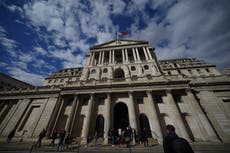Jeremy Hunt’s mortgage nightmare could be worse – he could be Matt Hancock
The now chancellor was health secretary for six years until 2018 and knew all about the shortcomings of our pandemic preparedness – but still the government did nothing, writes Tom Peck


Jeremy Hunt probably isn’t quite sure when he’s awake and when he’s merely having nightmares.
At some point today, he will have got out of bed, opened up his computer and looked at the same old numbers. The ones about the hundreds and hundreds of billions of pounds of government debt, and then the ones about how fast the interest on that debt is rising, and at that point it’s distinctly possible he will have tried to jump in the air in the hope that his legs don’t move and that none of it is real.
After that, he took a very short journey over to the Covid inquiry, where he nodded his head, smiled, let out a bit of laugh and told them a very funny story about the time he had to kick every single intensive care patient out of their beds and leave them to die in the street. That bit, he’s pretty sure, was just a simulation; a now notorious training exercise called Cygnus in 2016, that showed how hopelessly ill-prepared the country was for a pandemic, to which it responded by spending the next three years preparing for Brexit instead.
Hunt explained that he actually had to stop the training exercise at that point. That he couldn’t bring himself to do it. He is, after all, an extremely polite chap. It is possible no one had explained to him that it wouldn’t actually involve him personally going round to every patient on every ward and saying “Excuse me, awfully sorry to trouble you, and I know this is frightfully inconvenient but I’m afraid I really rather do need this bed of yours, so I was rather hoping, if it’s not too much trouble, that you might be kind enough to go and die somewhere else? Oh, thank you, thank you so much. Thank you”.
Hunt was health secretary back then. He would carry on being health secretary for two more years. The conclusions reached by Exercise Cygnus, he explained, were that in the event of a massive pandemic in which hundreds of thousands of people were going to die, that none of the essential structures were in place to really do very much about it. So they didn’t do anything about it.
But that, he reckons, was not even the most major failing. Having concluded they didn’t know what they would do in the event of a widespread influenza pandemic, they also didn’t ask what they would do in the event of a different pandemic – a respiratory pandemic, of the kind that had already happened in other parts of the world.
Unsurprisingly, having concluded that they were hopelessly ill-equipped to cope with the thing they thought might happen, they also were hopelessly ill-equipped to cope with the thing they didn’t think might happen, even though it was more than slightly likely that it would.
This, Hunt did not quite need to say, was quite a suboptimal state of affairs. After that, it got worse.
Jeremy Hunt was health secretary for six years. He stopped being health secretary in July 2018, when he was promoted to foreign secretary, the opportunity having been created by Boris Johnson quitting the cabinet over Theresa May’s “Chequers Agreement” (which a few weeks later he then voted for). A year after that, he stopped being in the cabinet altogether, having had the temerity to challenge Johnson for the Tory leadership.
Which meant that, when the once-in-a-century pandemic arrived, the man who had at least learnt some of the lessons of Exercise Cygnus had been replaced by Matt Hancock.
In two hours of questioning, Hunt was not asked any of the questions that the man on the street might have asked. Like, for example, “would you have evacuated hospital patients into care homes without testing them for Covid first?” Or, “if you had gone on TV and said it was illegal to have sex with someone from outside your household, would you have conducted your extramarital affair directly in front of the CCTV camera in your own office?”
Perhaps they are saving those questions for the man himself. We can but hope.
Hunt did have a lot of interesting things to say. Like, to give an example: one of the problems with the ways decisions were made in those very early days was that ministers aren’t that likely to challenge the advice of scientists, so it might be better if other scientists were around to do so.
He even suggested it might have been better if the advice from government scientists had been made public right from the very start, so that people who might have had better ideas could make those known. We should have taken better advantage, he said, of our open press and our world class academia.
It’s an interesting idea, isn’t it. But there are risks. Politicians are well known for trying to dip the hands of others in the blood, to save themselves via the power of collateral, which is what they tend to do when they publicly invite others to “help”.
It’s possible Hunt knows that. It’s possible it might even be why, just before his trip to the Covid inquiry, he made a very public show of the fact that he’s been inviting Martin Lewis, Britain’s most trusted public figure by some margin, to Downing Street to ask him what on earth he should do about mortgages.
It’s doubtful Lewis has any bright ideas of his own to a question that is all but impossible to answer. But he hasn’t yet asked Matt Hancock; so things could, in theory, be worse.






Join our commenting forum
Join thought-provoking conversations, follow other Independent readers and see their replies
0Comments